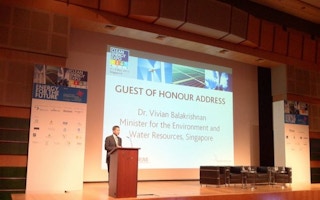Singapore’s Minister for Environment and Water Resources, Dr Vivian Balakrishnan, on Tuesday urged governments to remove fossil fuel subsidies, saying such subsidies distort the economy and energy consumption.
“It’s not the right thing to do in the long term,” he told the opening ceremony of the Clean Energy Expo Asia. Dr Balakrishnan noted that “we are living in a point of great inflection,” as the world population hits 7 billion this month and millions of people move from rural communities into cities.
He urged governments and businesses to think long-term when making decisions as “depending on the choices of individual governments, spread out across the world today, our choices of technology will have implications on sustainable development, on fossil fuel use, on carbon emissions for the next three to five decades”.
The minister noted that the problem for the last two centuries is that the world has enjoyed economic growth without paying for its cost to the environment such as pollutions of the seas and the degradation of rivers and water resources. In an increasingly resource-constrained world, those costs are no longer free, and we have to pay the right price for energy, he said.
There have been different methods offered to quantify the social environment and the health cost of pollutants and carbon in the atmosphere, he noted, such as a carbon tax or a global treaty on climate change that will bind all governments to specific targets.
But he said it is unlikely that the world will reach a legally binding deal at the upcoming United Nations climate summit in Durban, South Africa, at the end of this month.
“There isn’t the political will or financial resources to make such a deal stay,” he added. “The biggest emitters in the world are too busy with their own problems, too worried about dealing with competition from each other in order to arrive at a collective position and make common sacrifices in order for us to act properly.”
He emphasised that rational government policies are crucial to creating logical and effective energy markets. Dr Balakrishnan cited Singapore as an example, where the government has not issued energy subsidies. The Republic has liberalised its energy market and allowed technologies and companies to compete.
“By having an open, competitive market, you can get good outcomes and progress,” he said. And because Singapore does not have subsidies, people are motivated to conserve energy and reduce wastage, he added.
Malaysia’s Minister of Energy, Green Technology and Water, Peter Chin, who also spoke at the three-day conference held at Suntec, acknowledged that subsidies on fossil fuel “adds to the problem”, especially because it discourages power companies from investing in more costly but cleaner sources of energy.
However, he said it was politically difficult to remove such subsidies, especially in rural communities where the poor cannot cope with higher energy prices.
Instead, Malaysia has responded by setting up a legal framework to incentivise the clean energy industry by providing feed-in tariffs for solar power, for example, that guarantees companies that generate solar power a premium electricity rate.
The Malaysian government has also set up a RM $300 million renewable energy fund which Mr Chin says he hopes will help the country become one of the leaders within Asean for clean energy.
Malaysia is expecting RM 70 billion of revenue and the creation of 52,000 jobs for the economy from this industry by 2020. Singapore has similar targets; the cleantech industry is expected to contribute S$3.4 billion to gross domestic product by 2015 while providing 18,000 jobs within the same period.
Clean Energy Expo Asia is organised by event firm Koelnmesse and the Sustainable Energy Association of Singapore (SEAS) under the umbrella of the annual Singapore International Energy Week.
Eco-Business.com’s coverage of Clean Energy Expo Asia 2011, part of Singapore International Energy Week 2011, is brought to you by Schneider Electric.
Click here to read all stories from Clean Energy Expo Asia 2011.

















